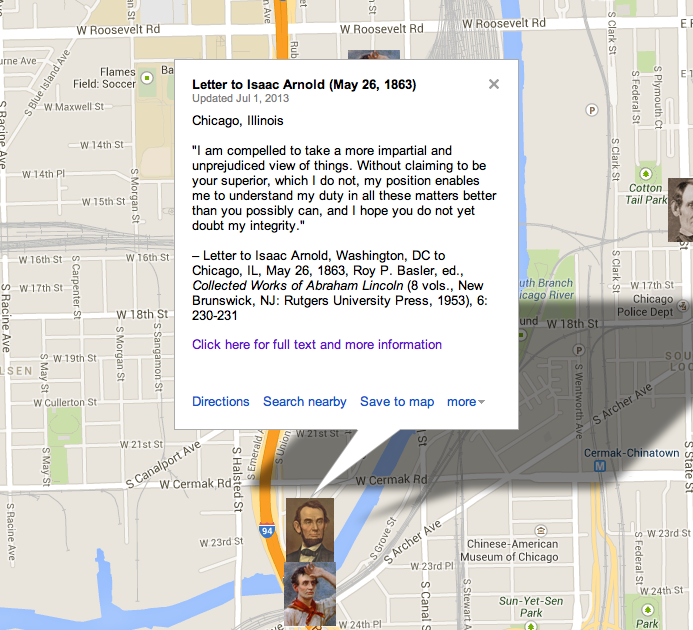Ranking
#146 on the list of 150 Most Teachable Lincoln Documents
Annotated Transcript
“Without claiming to be your superior, which I do not, my position enables me to understand my duty in all these matters better than you possibly can, and I hope you do not yet doubt my integrity.”
On This Date
HD Daily Report, May 26, 1863
The Lincoln Log, May 26, 1863
Custom Map

View in Larger Map
How Historians Interpret
“In May, as Grant daringly marched his army from triumph to triumph in Mississippi, Lincoln said: ‘I have had stronger influence brought against Grant, praying for his removal, since the battle of Pittsburg Landing, than for any other object, coming too from good men.’ (A year earlier, when Grant was caught unprepared for the Confederate onslaught at Shiloh — also known as Pittsburg Landing — he was roundly criticized, even though the Rebels were eventually driven from the field.) But, Lincoln added, ‘now look at his campaign since May 1. Where is anything like it in the Old World that equals it? It stamps him as the greatest general of the age, if not of the world.’ On May 23, he wrote that Grant’s campaign was ‘one of the most brilliant in the world.’”
–Michael Burlingame, Abraham Lincoln: A Life (2 volumes, originally published by Johns Hopkins University Press, 2008) Unedited Manuscript by Chapter, Lincoln Studies Center, Volume 2, Chapter 30 (PDF), 3360.
“The climactic battles of 1863, despite stunning Union victories, had failed to resolve the outcome of the Civil War. The fall of Vicksburg in the west delivered a devastating blow to the Confederacy in that region and enhanced Major General Ulysses S. Grant’s growing reputation and stature. Lincoln had watched Grant’s campaign unfold with both approval and reservations. The more Grant’s plans unfolded, however, the more impressed Lincoln became, asserting in May that the general’s strategy was ‘one of the most brilliant in the world.’”
Richard R. Duncan, Lee’s Endangered Left: The Civil War in Western Virginia Spring of 1864 (Baton Rouge: Louisiana State University Press, 1998), 1.
NOTE TO READERS
This page is under construction and will be developed further by students in the new “Understanding Lincoln” online course sponsored by the House Divided Project at Dickinson College and the Gilder Lehrman Institute of American History. To find out more about the course and to see some of our videotaped class sessions, including virtual field trips to Ford’s Theatre and Gettysburg, please visit our Livestream page at http://new.livestream.com/gilderlehrman/lincoln
Searchable Text
Private & confidential
Executive Mansion,
Washington, May 26. 1863.
Hon. I. N. Arnold.
My dear Sir:
Your letter advising me to dismiss Gen. Halleck is received. If the public believe, as you say, that he has driven Fremont, Butler, and Sigel from the service, they believe what I know to be false; so that if I were to yield to it, it would only be to be instantly beset by some other demand based on another falsehood equally gross. You know yourself that Fremont was relieved at his own request, before Halleck could have had any thing to do with it— went out near the end of June, while Halleck only came in near the end of July. I know equally well that no wish of Halleck’s had any thing to do with the removal of Butler or Sigel. Sigel, like Fremont, was relieved at his own request, pressed upon me almost constantly for six months, and upon complaints that could have been made as justly by almost any corps commander in the army, and more justly by some. So much for the way they got out. Now a word as to their not getting back. In the early Spring, Gen. Fremont sought active service again; and, as it seemed to me, sought it in a very good, and reasonable spirit. But he holds the highest rank in the Army, except McClellan, so that I could not well offer him a subordinate command. Was I to displace Hooker, or Hunter, or Rosecrans, or Grant, or Banks? If not, what was I to do? And similar to this, is the case of both the others. One month after Gen. Butler’s return, I offered him a position in which I thought and still think, he could have done himself the highest credit, and the country the greatest service, but he declined it. When Gen. Sigel was relieved, at his own request as I have said, of course I had to put another in command of his corps. Can I instantly thrust that other out to put him in again?
And now my good friend, let me turn your eyes upon another point. Whether Gen. Grant shall or shall not consummate the capture of Vicksburg, his campaign from the beginning of this month up to the twenty second day of it, is one of the most brilliant in the world. His corps commanders, & Division commanders, in part, are McClernand, McPherson, Sherman, Steele, Hovey, Blair, & Logan. And yet taking Gen. Grant & these seven of his generals, and you can scarcely name one of them that has not been constantly denounced and opposed by the same men who are now so anxious to get Halleck out, and Fremont & Butler & Sigel in. I believe no one of them went through the Senate easily, and certainly one failed to get through at all. I am compelled to take a more impartial and unprejudiced view of things. Without claiming to be your superior, which I do not, my position enables me to understand my duty in all these matters better than you possibly can, and I hope you do not yet doubt my integrity.
Your friend, as ever
A. LINCOLN

